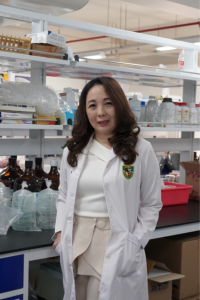Indonesia

Related Research:
My research passion for more than twenty years is related to food-borne pathogens. Starting with research on prevalence, molecular detection, genetic diversity and antibiotic resistance of foodborne pathogens, majority of street food are contaminated with pathogens and they are highly resistant to antibiotics and are able to form biofilm. Therefore, I continue the research to treat the biofilm using antibiofilm explored from microbes. Research on combating foodborne and aquaculture pathogens and their biofilms were continue not only using antibiofilm but also using bacteriophage which are able not only to control the growth of pathogens but also their biofilms.
Relation to Climate Resilience and Adaptation Theme:
Climate change is increasing human exposure to pathogens and has already had an impact on human health. Climate change also have a drastic effect on food safety, and food security including agriculture and aquaculture worldwide. From the perspective of the pathogens, climate changes force microbes to adapt presenting opportunities for pathogens to move about and evolve in unknown ways that may increase virulence and host range. Our concern is the presence of pathogens in food, food products as well as aquaculture. Treatments to reduce food-borne pathogens is mostly using chemical preservative and treatment of human bacterial infection is using antibiotics. On the other hand using chemical preservative might have side effect to human health and most of pathogenic bacteria are able to form biofilm that could not be treated using those preservative agents. Treatment on bacterial infection in human and aquaculture organism is using antibiotics that might increase the burden of antibiotic resistance and the effect of biofilm formation by those pathogens make the treatment become more difficult even using high concentration of antibiotics. Based on these condition, it is important to explore alternative solutions to combat food-borne pathogens and aquaculture pathogens. Antibiofilm and bacteriophage are appropriate approach on this matters. Antibiofilm from bioactive compound of environmental microbe could inhibit biofilm formation and disrupt the mature biofilm of pathogenic bacteria. While bacteriophage have both capacity in reducing the growth of pathogens and control biofilm formation specifically. By using antibiofilm and bacteriophage we can control the growth, biofilm formation as well as virulence properties of pathogens, since antibiofilm can also inhibit cell to cell communication which is important in inducing expression of virulence factors. Control of pathogens in food and aquaculture may increase food safety and food resilience to mitigate the effect of climate change.
Affiliated Organisation:
Atma Jaya Catholic University of Indonesia
